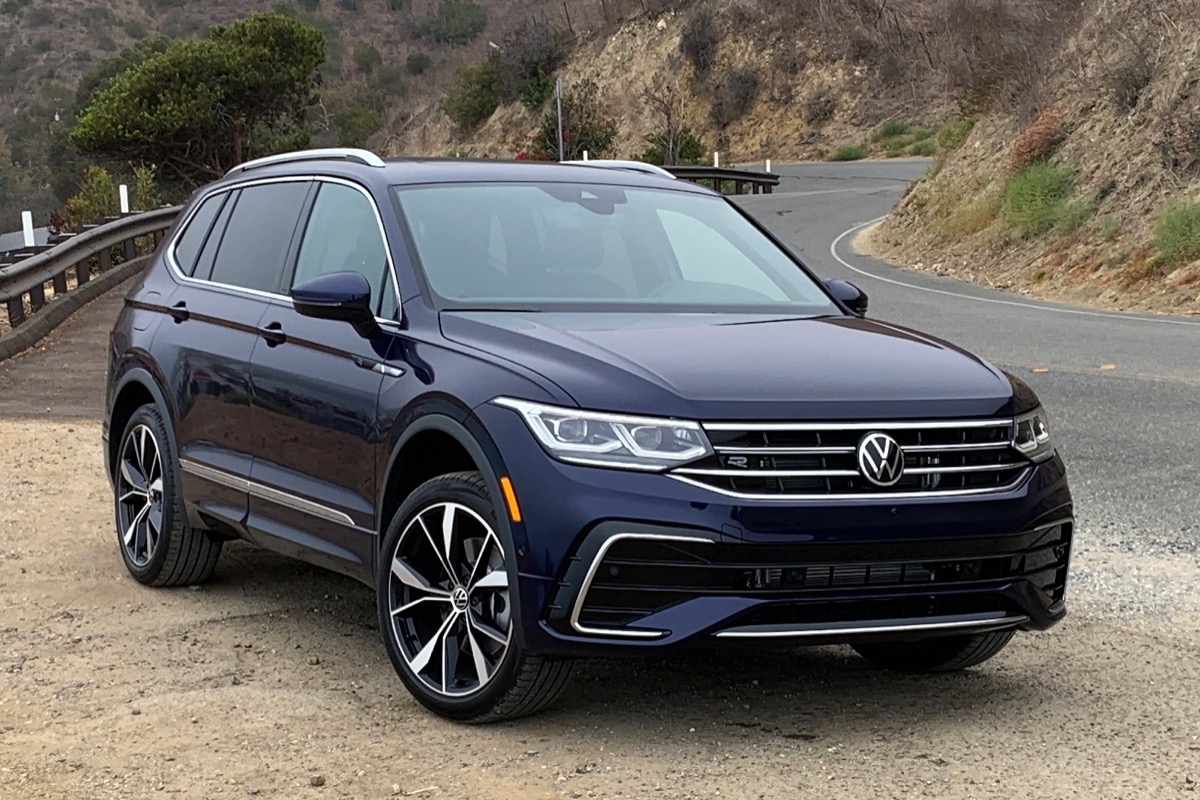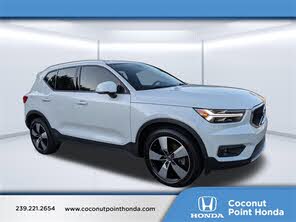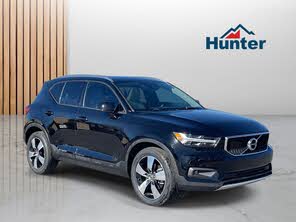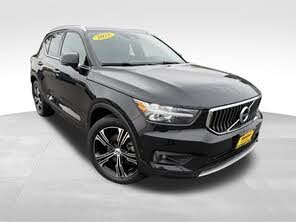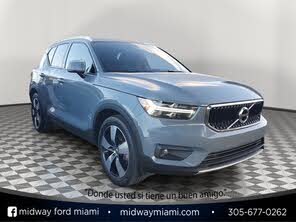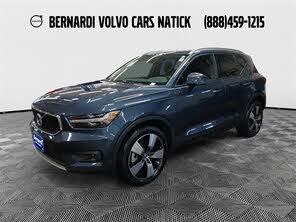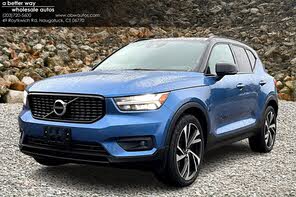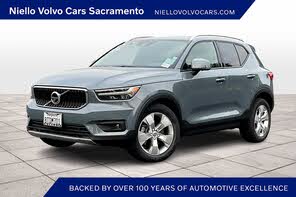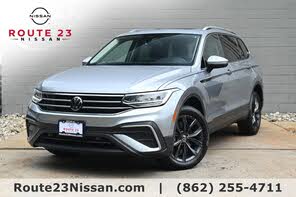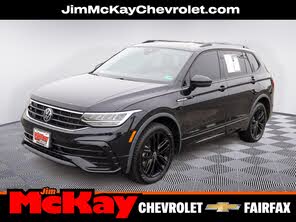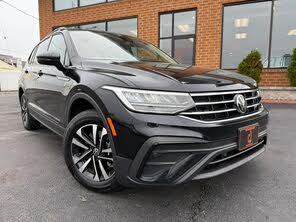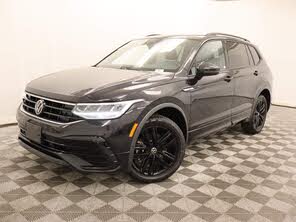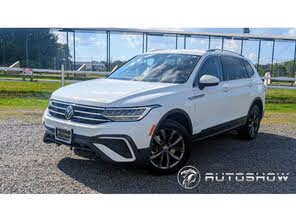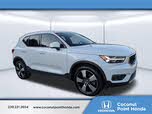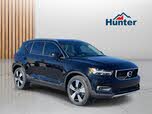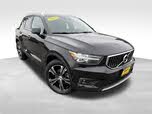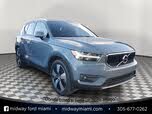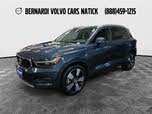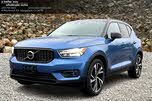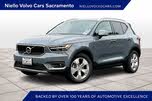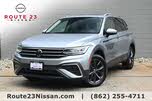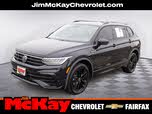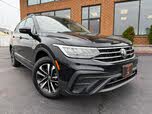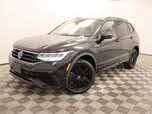2021 Volvo XC40 vs 2022 Volkswagen Tiguan
Overview | |
MSRP$33,700 | MSRP$26,490 |
Listings158 | Listings2918 |
Ratings & Reviews | |
User Reviews | User Reviews |
Expert reviews8.0 out of 10 | Expert reviews7.7 out of 10 |
Pros
Cons
| Pros
Cons
|
2021 Volvo XC40 Reviews SummaryIntroduced for the 2019 model year, the Volvo XC40 enters 2021 with one major change—the addition of an all-electric powertrain option. The 2021 Volvo XC40 Recharge is the Swedish automaker’s first mass-market electric vehicle, in fact. The Recharge will be sold alongside gasoline versions of the XC40, which carry over largely unchanged, and compete against small luxury crossovers like the Audi Q3, BMW X1, Mercedes-Benz GLA-Class, and Lexus UX. With its electric powertrain, the Recharge is a de facto Tesla Model Y competitor. It’s also priced similar to high-end versions of the Ford Mustang Mach-E, although the two electric crossovers have somewhat different philosophies. In addition to that zero-emission powertrain, the Recharge gets an Android-based operating system, over-the-air (OTA) software update capability for all vehicle systems, and some updates to driver-assist tech. These changes don’t apply to gasoline 2021 XC40 models, but Volvo does plan to add the Android operating system to more vehicles in the future. Since the Recharge is the main new thing for the 2021 XC40, that’s what we focused on for this review. While the gasoline XC40 is available in three trim levels—Momentum, R-Design, and Inscription—with front-wheel drive (FWD) or all-wheel drive (AWD), the Recharge is only offered in a single trim level, with standard AWD. | |
2022 Volkswagen Tiguan Reviews SummaryVolkswagen’s most popular model is the Tiguan compact SUV, representing quite a turn of events compared to 2017, when the original version languished at or near the bottom of consumer consideration lists. What happened? Compact crossover SUV sales exploded like a California wildfire during a Santa Ana wind event, and the second-generation Tiguan grew in size to become one of the biggest of the traditional small SUVs. Unsurprisingly, with the updated 2022 Volkswagen Tiguan, the automaker elects to hone instead of change this recipe for success. | |
No video found | No video found |
Popular Features & Specs | |
Engine2.0L 187 hp I4 | Engine2.0L 184 hp I4 |
Drive TrainFWD | Drive TrainFWD |
Seating Capacity5 | Seating Capacity7 |
Horsepower187 hp @ 4700 rpm | Horsepower184 hp @ 6000 rpm |
MPG City23 | MPG City23 |
MPG Highway32 | MPG Highway30 |
Engine | |
Engine Name2.0L 187 hp I4 | Engine Name2.0L 184 hp I4 |
Torque221 lb-ft @ 1400 rpm | Torque221 lb-ft @ 1900 rpm |
Horsepower187 hp @ 4700 rpm | Horsepower184 hp @ 6000 rpm |
DrivetrainFWD | DrivetrainFWD |
Fuel Economy | |
MPG City23 | MPG City23 |
MPG Highway32 | MPG Highway30 |
Interior | |
Leather SeatsStandard | Leather Seats |
Seating Capacity5 | Seating Capacity7 |
Safety | |
Front Crash Overall5 | Front Crash Overall |
Side Crash Overall5 | Side Crash Overall5 |
Dimensions & Capacity | |
Cargo Space20.7 cu ft | Cargo Space12.0 cu ft |
Curb Weight3627 lbs | Curb Weight3765 lbs |
Height65.3 in | Height66.4 in |
Length174.2 in | Length186.1 in |
Width80.1 in | Width72.4 in |
Wheelbase106.4 in | Wheelbase109.9 in |
Maximum Payload1133 lbs | Maximum Payload1157 lbs |
Number of doors4 | Number of doors4 |
Maximum Towing Capacity3500 lbs | Maximum Towing Capacity1500 lbs |
Overview | ||
MSRP | $33,700 | $26,490 |
Listings | ||
Ratings & Reviews | ||
User reviews | ||
Expert reviews | 8.0 out of 10Read full review | 7.7 out of 10Read full review |
Pros & cons | Pros
Cons
| Pros
Cons
|
Summary | Introduced for the 2019 model year, the Volvo XC40 enters 2021 with one major change—the addition of an all-electric powertrain option. The 2021 Volvo XC40 Recharge is the Swedish automaker’s first mass-market electric vehicle, in fact. The Recharge will be sold alongside gasoline versions of the XC40, which carry over largely unchanged, and compete against small luxury crossovers like the Audi Q3, BMW X1, Mercedes-Benz GLA-Class, and Lexus UX. With its electric powertrain, the Recharge is a de facto Tesla Model Y competitor. It’s also priced similar to high-end versions of the Ford Mustang Mach-E, although the two electric crossovers have somewhat different philosophies. In addition to that zero-emission powertrain, the Recharge gets an Android-based operating system, over-the-air (OTA) software update capability for all vehicle systems, and some updates to driver-assist tech. These changes don’t apply to gasoline 2021 XC40 models, but Volvo does plan to add the Android operating system to more vehicles in the future. Since the Recharge is the main new thing for the 2021 XC40, that’s what we focused on for this review. While the gasoline XC40 is available in three trim levels—Momentum, R-Design, and Inscription—with front-wheel drive (FWD) or all-wheel drive (AWD), the Recharge is only offered in a single trim level, with standard AWD. | Volkswagen’s most popular model is the Tiguan compact SUV, representing quite a turn of events compared to 2017, when the original version languished at or near the bottom of consumer consideration lists. What happened? Compact crossover SUV sales exploded like a California wildfire during a Santa Ana wind event, and the second-generation Tiguan grew in size to become one of the biggest of the traditional small SUVs. Unsurprisingly, with the updated 2022 Volkswagen Tiguan, the automaker elects to hone instead of change this recipe for success. |
Video | No video found | No video found |
Popular Features & Specs | ||
Engine | 2.0L 187 hp I4 | 2.0L 184 hp I4 |
Drive Train | FWD | FWD |
Seating Capacity | 5 | 7 |
Horsepower | 187 hp @ 4700 rpm | 184 hp @ 6000 rpm |
MPG City | 23 | 23 |
MPG Highway | 32 | 30 |
Engine | ||
Engine Name | 2.0L 187 hp I4 | 2.0L 184 hp I4 |
Torque | 221 lb-ft @ 1400 rpm | 221 lb-ft @ 1900 rpm |
Horsepower | 187 hp @ 4700 rpm | 184 hp @ 6000 rpm |
Drivetrain | FWD | FWD |
Fuel Economy | ||
MPG City | 23 | 23 |
MPG Highway | 32 | 30 |
Interior | ||
Leather Seats | Standard | |
Seating Capacity | 5 | 7 |
Safety | ||
Front Crash Overall | 5 | |
Side Crash Overall | 5 | 5 |
Dimensions & Capacity | ||
Cargo Space | 20.7 cu ft | 12.0 cu ft |
Curb Weight | 3627 lbs | 3765 lbs |
Height | 65.3 in | 66.4 in |
Length | 174.2 in | 186.1 in |
Width | 80.1 in | 72.4 in |
Wheelbase | 106.4 in | 109.9 in |
Maximum Payload | 1133 lbs | 1157 lbs |
Number of doors | 4 | 4 |
Maximum Towing Capacity | 3500 lbs | 1500 lbs |
The 2021 Volvo XC40 had a traditional SUV styling with a tall, flat roof and upright rear hatch, fitting well with the rest of the Volvo lineup. It featured “Thor’s Hammer” LED headlights and a simple oval grille, with gasoline models offering a white contrasting roof for a retro look. The XC40 Recharge was distinguished by a blanked-off grille, subtle “Recharge” badging, model-specific alloy wheels, and a gloss black roof and mirror caps. It also had a slightly different rear bumper and a model-exclusive color, Sage Green Metallic. The interior was minimalist yet premium, with high-quality materials like real metal trim and a combination of Nappa leather and Nubuck textile upholstery. The design was coherent, with elements like the portrait-oriented touchscreen and air vents melding together seamlessly.
The 2022 Volkswagen Tiguan had a creased, folded, and symmetrical design that leaned towards conservatism, aging well over time. For 2022, it featured new front styling aligning it with the larger Atlas and Atlas Cross Sport models, a restyled grille with the new VW logo, and an available illuminated grille bar. LED headlights became standard, and new nameplate lettering adorned the rear liftgate. The Tiguan lineup was simplified into S, SE, SE R-Line Black, and SEL R-Line trims, with prices ranging from $25,995 to $36,995. The SEL R-Line test vehicle, priced at $37,970, had a sportier look with a trendy blacked-out appearance and machined-surface 18-inch alloy wheels. Inside, it featured a richer-looking cabin with perforated and piped leather upholstery, new technology, touch-sensing steering wheel and climate controls, and ambient lighting with 15 color choices.


















The 2021 Volvo XC40 offered a three-tiered powertrain lineup, with the electric Recharge at the top. The gasoline options included a 2.0-liter turbo four-cylinder engine and an eight-speed automatic transmission. The base FWD T4 had 187 horsepower and 221 pound-feet of torque, while the AWD T5 had 248 hp and 258 lb-ft. The Recharge shared its powertrain with the Polestar 2, featuring one electric motor for each axle, providing AWD and a combined 402 hp and 486 lb-ft. It had a 78-kilowatt-hour battery pack, with 75 kWh of usable capacity, and could accelerate from zero to 60 mph in 4.7 seconds. The T5 and T4 models achieved the same sprint in 6.1 and 8.1 seconds, respectively. All versions were electronically limited to 112 mph. The XC40 Recharge emphasized quiet and comfort, with excellent ride quality even on rough roads, and was capable of one-pedal driving using regenerative braking. It also had a towing capacity of 2,000 pounds.
The 2022 Volkswagen Tiguan continued with a turbocharged 2.0-liter four-cylinder engine producing 184 horsepower at 6,000 rpm and 221 pound-feet of torque at 1,900 rpm. An eight-speed automatic transmission transferred power to the front wheels, with an optional 4Motion AWD system that could send up to half the power to the rear wheels. The Tiguan offered Eco, Normal, Sport, and programmable Individual driving modes, with 4Motion models adding Onroad, Snow, Offroad, and Custom Offroad settings. The Tiguan had a MacPherson strut front suspension and a multi-link independent rear suspension, with 13.4-inch vented front discs and 11.8-inch solid rear discs. The variable assist steering lightened at low speeds and firmed up at highway speeds. The engine's torque arrived later than some turbocharged engines, resulting in momentary turbo lag when accelerating from a stop. The Tiguan was enjoyable to drive once the torque kicked in, but it could have benefited from more power and performance. The EPA rated the R-Line with 4Motion at 24 mpg in combined driving, and a short drive in Malibu, California, yielded a 24.7 mpg average.
The 2021 Volvo XC40 had no difference in passenger or cargo space between the Recharge and gasoline models. However, it was not particularly spacious, with less legroom in both front and rear seats compared to the Tesla Model Y and Ford Mustang Mach-E, and a smaller cargo area. The frunk was also small, with much of the space occupied by powertrain hardware. The gasoline XC40 was more competitive on interior space compared to rivals like the Audi Q3 and BMW X1. Volvo compensated for the lack of space with clever storage solutions, such as a removable trash bin in the center console, a bag hook in the glovebox door, and extra-large door bins due to the relocation of the Harman Kardon system's speakers to the dashboard. A wireless charging pad was optional, and a single USB-C port was standard, but second-row occupants lacked phone-charging options.
The 2022 Volkswagen Tiguan was spacious enough to be compared to smaller midsize SUVs like the Chevrolet Blazer, Hyundai Santa Fe, Jeep Cherokee, and Kia Sorento. FWD models had a standard third-row seat, while 4Motion models did not. The SEL R-Line was exceptionally comfortable, with leather-wrapped front seats offering eight-way power adjustment, heating, and ventilation. The second row was roomy and comfortable for adults, with rear air conditioning vents, a USB charging port, and decent storage. The switch to touch controls on the steering wheel and dashboard for 2022 looked sophisticated but was harder to use. Cargo space was among the best in the class, with FWD models offering 12 cubic feet behind the third row, 33 cubic feet with the third row folded, and 65.5 cubic feet with the rear seat folded. The 4Motion model had 37.6 cubic feet behind the back seat and 73.4 cubic feet with the rear seat folded, both figures in midsize SUV territory.
The 2021 Volvo XC40 Recharge featured the Android Automotive OS infotainment system, while gasoline models continued with the previous system. Android Automotive OS used Google apps like Google Assistant and Google Maps, with Android phone users able to sync their personal Google accounts. The system included Apple CarPlay, Android Auto, and Bluetooth hands-free phone connectivity, with a 9-inch touchscreen and a 12.3-inch digital instrument cluster. The Recharge also had OTA update capability for the infotainment system and other vehicle functions. It lacked a start button, with the car starting when the driver shifted out of park with the key fob present.
The 2022 Volkswagen Tiguan had standard digital instrumentation, with most versions using an 8-inch display and the SEL R-Line featuring a 10.25-inch Digital Cockpit Pro system. The MIB3 infotainment system carried over in all but the base Tiguan S, which used MIB2 with a 6.5-inch touchscreen. MIB3 had an 8-inch touchscreen, standard Car-Net connected services, App-Connect smartphone mirroring, and SiriusXM 360L satellite radio. The SEL R-Line had a redesigned navigation system and a nine-speaker Fender premium audio system. Natural voice recognition required a Plus Speech upgrade and an active Car-Net Hotspot subscription. Car-Net's Remote Access plan was complimentary for five years, with additional plans available for a fee. The Tiguan also offered an available Park Assist system for autonomous parking, standard on the SEL R-Line.
The gasoline 2021 Volvo XC40 received the highest “Top Safety Pick+” rating from the IIHS and a five-star overall crash-test rating from the NHTSA. These ratings did not apply to the electric XC40 Recharge, but Volvo expected it to perform well in crash tests due to a safety cage around the battery and a redesigned front crash structure. The XC40 came with standard safety features like lane-keep assist, blind-spot monitoring, automatic emergency braking, rear parking sensors, hill-start assist, and hill-descent control. Optional features included traffic-sign recognition, reverse automatic emergency braking, a driver-alertness monitor, run-off road mitigation, oncoming lane mitigation, and Volvo’s Pilot Assist driver-assistance system. The Recharge model also had Volvo’s latest sensor suite, scalable for future advanced driver aids.
For 2022, the Volkswagen Tiguan had standard Front Assist (forward collision warning and automatic emergency braking with pedestrian detection) and Side Assist (blind-spot monitoring with rear cross-traffic alert). The Tiguan’s IQ Drive collection of advanced driving assistance systems included Travel Assist, combining adaptive cruise control with lane-centering assistance, and Emergency Assist, which operated when Travel Assist was active. The 2021 Tiguan earned a “Top Safety Pick” rating from the IIHS, and the 2022 model's new LED headlights and driver aids could improve that score.
CarGurus highlights
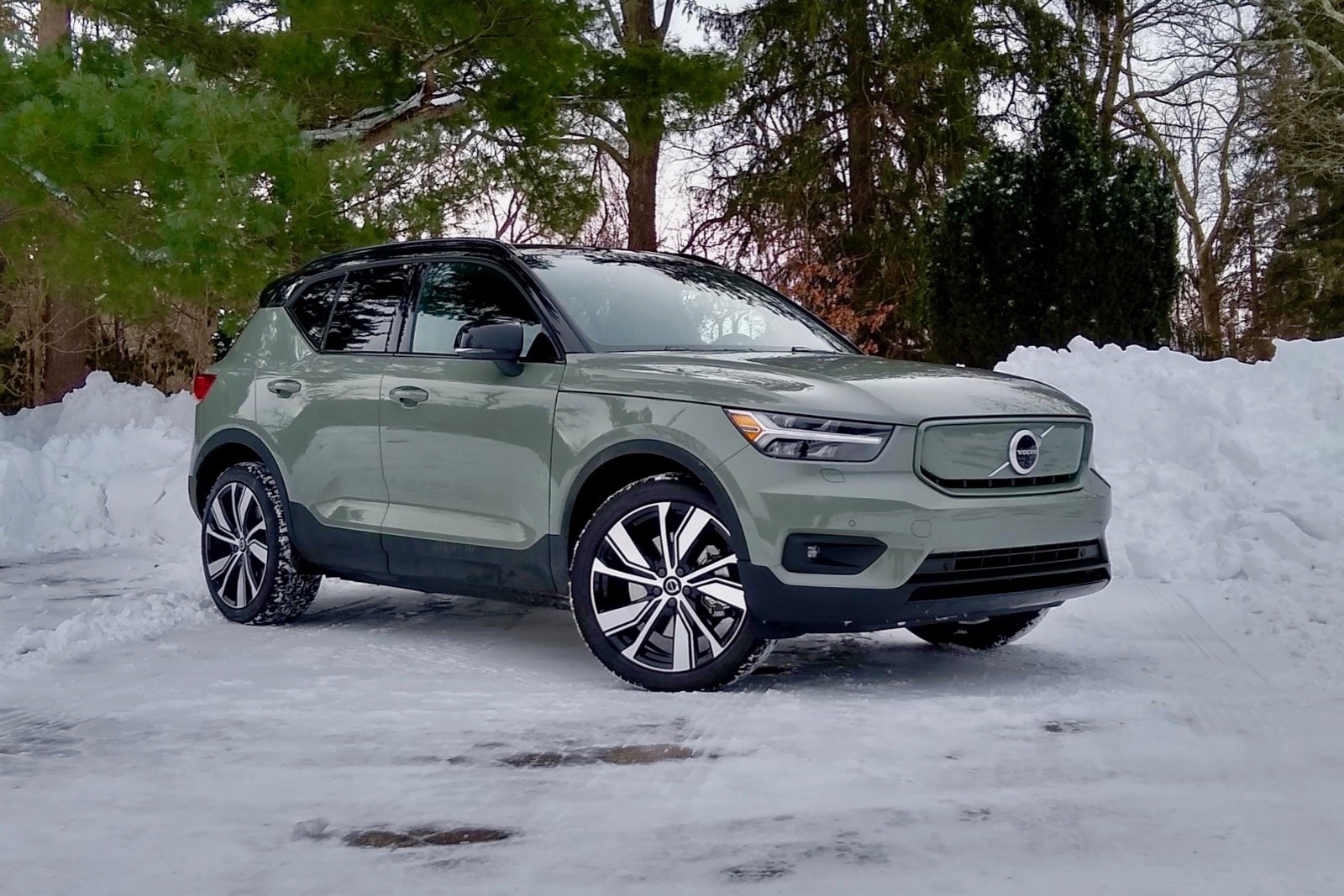
According to CarGurus experts, the overall rating for the 2021 Volvo XC40 is 8.0 out of 10, while the 2022 Volkswagen Tiguan scores 7.7 out of 10. Based on these ratings, the 2021 Volvo XC40 is the recommended choice, offering a more premium feel, advanced technology, and a higher safety rating.
Choose the 2021 Volvo XC40 if:
- You prefer a minimalist yet premium interior design with high-quality materials.
- You want a vehicle with advanced Google-based infotainment and OTA update capability.
- You value a long list of standard and optional safety features.
Choose the 2022 Volkswagen Tiguan if:
- You need a spacious interior with the option of a third-row seat in FWD models.
- You appreciate a sophisticated digital cockpit and a comprehensive infotainment system.
- You want a vehicle with advanced driving assistance systems like Travel Assist and Emergency Assist.
CarGurus highlights

According to CarGurus experts, the overall rating for the 2021 Volvo XC40 is 8.0 out of 10, while the 2022 Volkswagen Tiguan scores 7.7 out of 10. Based on these ratings, the 2021 Volvo XC40 is the recommended choice, offering a more premium feel, advanced technology, and a higher safety rating.
Choose the 2021 Volvo XC40 if:
Shop Now- You prefer a minimalist yet premium interior design with high-quality materials.
- You want a vehicle with advanced Google-based infotainment and OTA update capability.
- You value a long list of standard and optional safety features.
Choose the 2022 Volkswagen Tiguan if:
Shop Now- You need a spacious interior with the option of a third-row seat in FWD models.
- You appreciate a sophisticated digital cockpit and a comprehensive infotainment system.
- You want a vehicle with advanced driving assistance systems like Travel Assist and Emergency Assist.

By: CarGurus + AI
At CarGurus, our team of experienced automotive writers remain at the heart of our content operation, conducting hands-on car tests and writing insightful guides that are backed by years of industry experience. To complement this, we are harnessing AI to make our content offering more diverse and more helpful to shoppers than ever. To achieve this, our AI systems are based exclusively on CarGurus content, ratings and data, so that what we produce is both unique to CarGurus, and uniquely helpful to car shoppers.
